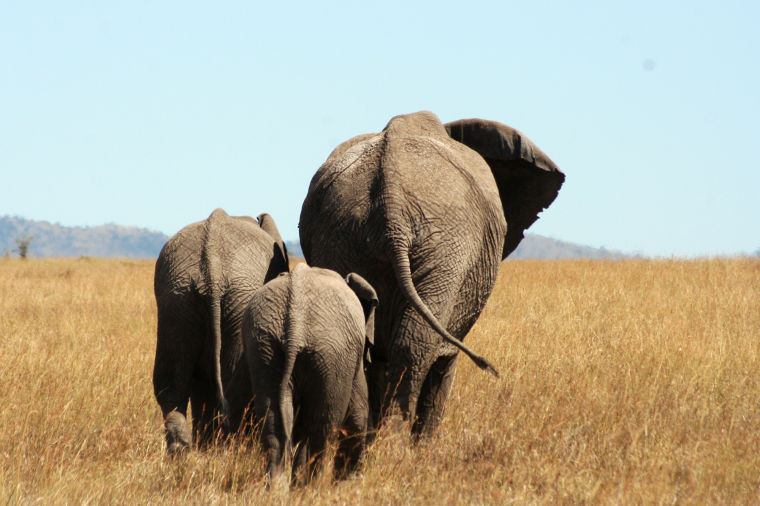Elephants don’t forget, but they may soon be forgotten
The subspecies of the endangered African elephant, the savanna elephant, roams the plains of Kenya’s Maasai Mara, March 11, 2011.
March 26, 2014
The largest mammal to walk the earth is being murdered: for a tooth.
I have loved African elephants for as long as I can remember, but the brutal slaughtering of these beloved creatures is making it harder to envision a future in which they exist.
The reason is ivory, an extremely valuable material used mainly for artistic and ornamental purposes.
As an innocent child, the thing that jumped out at me when I thought about elephants was their size.
These stunningly huge animals, however, possess other characteristics as well. Characteristics we as humans are very familiar with.
The day I saw my first wild elephant is one I will never forget. It was a day of awe and inspiration. Living in South Africa, seeing these creatures go about their lives opened up my eyes to just how perfect they are.
Happy and complete elephant families are now a less common sight, however, as scenes of giant elephant corpses and herds mourning their dead increase.
According to CBS News, 300 elephants were gunned down in a single day in 2012 in a national park in Cameroon.
Each day we returned to the Addo Elephant National Park in South Africa, my family and I were stopped at a checkpoint manned by armed rangers before entering and were asked to sign papers promising no harm would come to the animals.
The ranger explained that poachers are a common threat to elephants. “We see nothing but beauty,” he said in his thick Zulu accent. “But they see money.”
Protecting elephants has become an arms race: a race between life and death for the elephant, the poacher and the ranger.
Since the 1800s, the world’s African elephant population has decreased from 20 million to less than 1 million, according to PBS.
The same CBS News article reports the elephants will be functionally extinct within our lifetime.
It’s heart breaking because the elephants are aware of what’s going on and they don’t have a chance against the vicious killers holding AK-47s, ready to aim and shoot.
Elephant’s mourn their dead far too frequently these days. Orphan elephants with no one to protect them are killed by predators before they can even grow the tusks for which they will one day be hunted.
This extinction-driven trade is cold-blooded murder. There is no excuse for it, no underlying cause or justification. China’s ancient cultural traditions of ivory carving do not validate the brutal slaughter of African elephants.
According to National Geographic, 90 percent of elephant deaths are due to poaching. Only 10 percent of elephant deaths are due to natural causes.
CBS News reports the world has found substitutions for every one of ivory’s practical uses, including billiard balls, comb handles and piano keys.
However, due to China’s thriving industry of luxury goods made from ivory, the growth of its economy and market has made ivory accessible to both the elite and middle class, according to PBS.
Northern Rangelands Trust is a partnership of nearly 20 wildlife conservancies, and leader Ian Craig told CBS News the deterioration of African elephants is getting worse.
The demand for ivory has exceeded the number of elephants left and has resulted in a critical drop in their population.
African governments are unable to stop the poaching and the price of ivory is only encouraging the killers to continue slaughtering the elephants, despite their own risk of death or imprisonment.
Unless the market in ivory ends and the poaching ceases, the African elephant is going to disappear off the face of the earth.
We’ve heard the saying “elephants never forget.” What I’d like to know, however, is who will remember them when they’re gone, because at this rate, our children will probably grow up without seeing a wild elephant.
The ivory trade will end. There’s no question about it. Why? The resource is finite. Ivory is a resource grown by animals: animals we are killing.
– Sarah Steger is a sophomore communication major from Perth, Australia. She can be contacted at 335-2290 or by [email protected]. The opinions expressed in this column are not necessarily those of the staff of The Daily Evergreen or those of Student Publications.






















